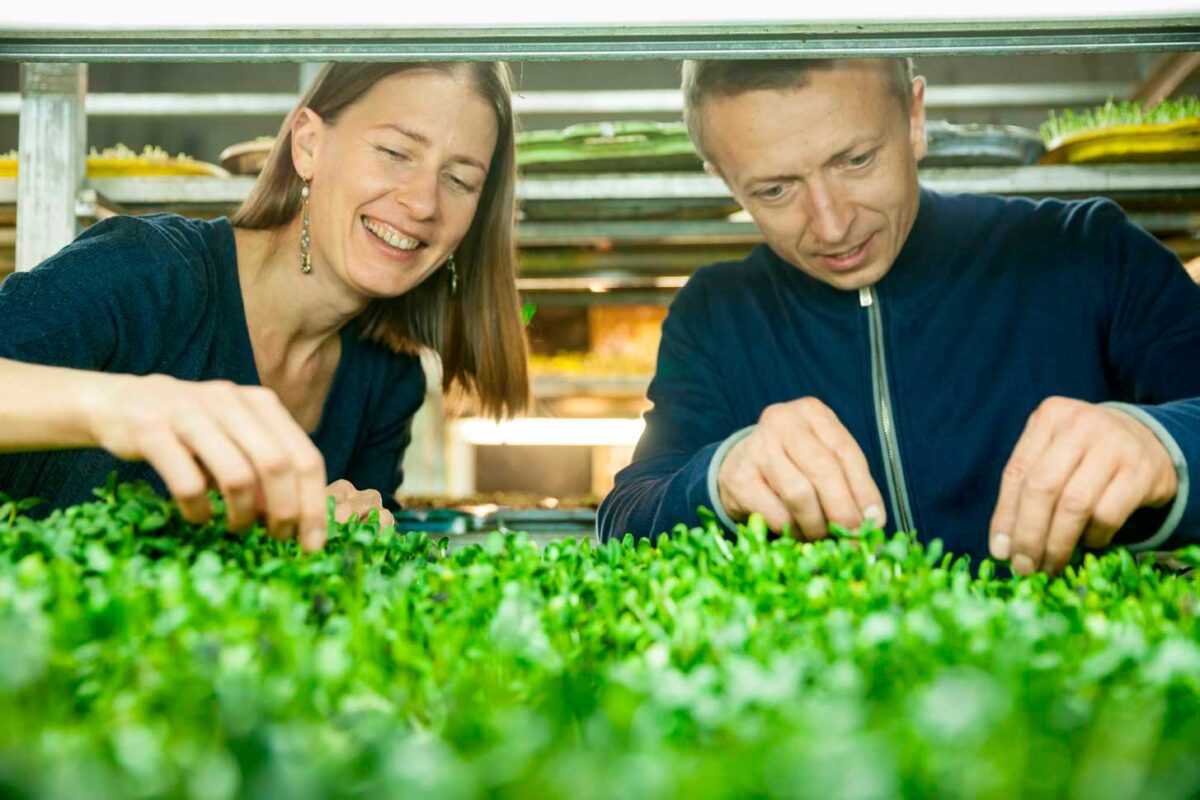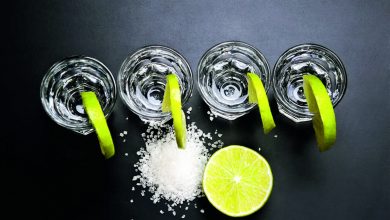
Their family firm Microgreen grows sprouts of popular agricultural plants — peas, radishes, sunflowers and cabbages. The greens which have just dawned under the sun are valued highly by sport clubs, restaurants and simply by rawtarians. For the first ones these greens are a complex of rare vitamins for sport, for the second ones they serve as an edible décor for dishes, for the third ones they make an alternative to store bought greens. At present the sprouts couched by Ryzhkova and Kiselyov can be found in the recipes of 50 restaurants, 10 sport clubs and in all large-scale outlet chains. Per day the entrepreneurs grow and sell 30 kg of their crops. One kilogram of the germinated greens costs about 300 hryvnias.
The translator Ryzhkova and the builder Kiselyov started to grow miniature greens back in 2007. The newcomer rawtarians read out in Internet about health-giving properties of sprouts of different vegetables and plants. The young people bought an ultraviolet lamp, a pair of flowerpots and seeds of various vegetables. They gathered their first crop in a few days. The greens which had just come up under the sun became the basis for salads and vegetable shakes, to which the couple started treating their guests. Their friends appreciated the new diet and came to ask to grow greens for them. «There it was that we grasped it could become not a bad business, and we decided to launch it not in Odessa but in Kyiv», Ryzhkova says.
In 2010 the entrepreneurs moved to the capital. The logic was simple — in a megalopolis there are much more people curious about microgreens than in Odessa. The company was named in tune with its main product — Microgreen. On the skirts of the capital the husband and wife leased a vacant shed where they installed several tiers of containers with seedlings — in such a way they saved effective area for bedding. The remaining savings were used for a special lighting and batch wetting system.
However, growing sprouts even of the commonest greens was not a trivial task. Different vegetables sprout at a different temperature during different seasons and within different timeframes. Having grown ones it was too easy to miss the required stage in other ones. To avoid this situation, the entrepreneurs installed a separate lighting system for each variety of plants. Ultraviolet lamps were burning longer in wintertime simulating summer, and in spring and in summer they were adjusted to summertime. The alternation of day and night was supervised by a time relay; a special climate control system was monitoring the temperature at the artificial field. Even the water for wetting underwent specific filtering so that it would not do harm to the plants at such a tender age. Start-up investment constituted USD 20,000. «We were miles away from agronomy, and we had to do a lot of things through trial and error — such as, for instance, selecting growing media for the plants, seeking for good seeds, adjusting the conditions for each variety», Ryzhkova says.
However, in spite of all preparations, the first pancake in Kiev was a blob. The sale of the first lot of microgreens was undertaken by the store Chumatskyi Shliakh trading in gourmet foods and cookery. It turned out that even Ukrainian gourmets were not ready to experiment with their home menu and to buy sprouts of plants so unlike the adult plants. Microgreen owners decided to let the Ukrainians taste their food item immediately in dishes. Ryzhkova and Kiselyov offered their greens to the restaurant owners of the capital city, who were always willing to astonish their guests. The expectation proved to be right. «As soon as the buyers had tasted the sprouts of greens in hot and cold dishes, they came to buy microgreens for themselves after that,” says Taras Kyryliuk, a chef of the restaurant of the sport club Piatyi Element, who was among the first ones who started purchasing the greens produced by Microgreen. Within six months of deliveries the minimum restaurant lot increased tenfold, up to half a kilo, and the number of ordering customers of microgreens — up to 20 restaurants.
The Odessans spent three years for setting up the production in Kiev. Meanwhile several more similar companies entered the market. The business rivals were not too much concerned about the right technology; they were making active use of various fertilizers and working by rude and crude methods, in underground greenhouses without certificates. «This enabled them to offer a lower price, and even though, the restaurants wishing to save money and buying from them still admit the quality of our product,” Ryzhkova assures. «As yet, they are the only ones who comply with all our wishes as to the quality of sprouts, both in terms of their color and growth. They fulfill what we dream about when we are turning over food magazines,” Kyryliuk affirms.
Microgreen owners are looking for their buyers at thematic exhibitions and festivals of organic products. At the same time special tastings are held in sport clubs and supermarket stores. After appearance of the greens produced by the Odessans at the festivals Best Food Fest and Healthy Food Festival the most popular greens of the Odessans, sprouts of peas and alfalfa, came to organic food boutiques. With each new order the production facilities grew. By the year 2014 the area of greenhouses of Ryzhkova and Kiselyov increased up to 150 square meters on which the horticulturists gathered then about 30 kg of greens daily. Such production outputs enabled them to find their way to the market stalls of the biggest outlet chains — to the stores of the Megamarket supermarket chain, to the Fozzy Group’s delicatessen markets Le Silpo, as well as to the GoodWine stores, popular wine and all natural food stores of the capital city. Microgreen offers the quality commeasurable with European quality, and the prices are much lower than ones of the imported products,” says Pavel Skorogonskiy, manager for fruits and vegetables at GoodWine.
Ideas for new kinds of microgreens are prompted to Ryzhkova and Kiselyov by the market itself. For one thing, a few Japanese restaurants asked to grow greens especially for them to serve Japanese food — of bright red color. Sprouts of beets, radishes and cabbages suited the Japanese demands. The following order of the same customers became perilla sprouts. The plant regarded as a weed in Europe is used as a raw material for medicines and seasonings in the Asian countries. «The interest of Japanese restaurants in microgreens is very intense right now. For instance, I received an order to grow sprouts of fennels, and in order to buy the seeds of them I had to go to Moscow,” confirms the trend Sergey Ivanchenko, General Director at Ferma, an Odessa company which is also growing microgreens.
In the short-term plans, Microgreen aspires to introduce its new product to the market — edible flowers. Flower salads have been on restaurant menu cards of Europe for a long time; however, they are still exotica for Ukraine. Ryzhkova offers to the Ukrainians to taste nasturtiums, violets and begonias known from the childhood. Nasturtiums will pass as a mustard substitute, violets can serve as perfect plating for desserts, and begonia leaves taste like dock. The entrepreneurs reckon to receive help in promoting unusual greens to the populace again from the restaurant owners inclinable to experimenting. «I am not sure that someone else in Ukraine is offering such a tasty and sightly décor as flowers», Ryzhkova says.
Alongside with new products, the company wants to automate the production process. A special automated germinating box for growing microgreens is ready set for launch. Now it will be the computer that will add growing medium to the soil, wet the young plants and heat the patches. In such a way the company wants to reduce the amount of hand labor, lower product costs, at the same time increasing the production outputs of green sprouts. They will need it before long. According to Alexey Povtoreyko, an instructor of Kiev Association of Chefs and the chef of the Scotch house Whisky Corner, with beginning of the present day crisis the restaurant owners gave up the imported greens and started purchasing the domestic ones, which are markedly cheaper. «The potential of the Ukrainian market is strong, and it will grow for many years», says Povtoreyko. «This is not the market that is small, but the supply is,” agrees Irina Melanyina, a co-founder at Zelena Dribnota, a Kyiv company which is also growing microgreens.
Text: Maxim Birovash





